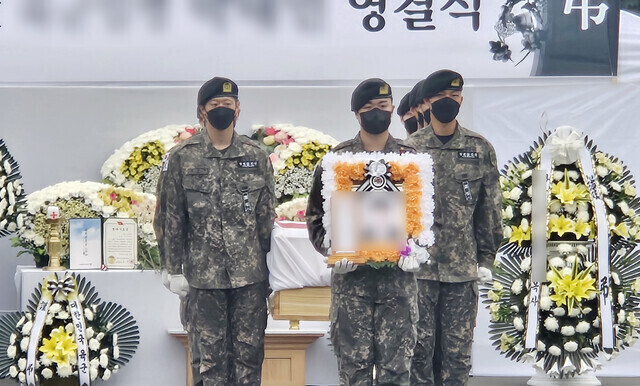hankyoreh
Links to other country sites 다른 나라 사이트 링크
‘Get up’: Drill instructor berated Korean soldier who collapsed during punishment and later died

A company leader implicated in the death of an Army trainee during a pack drill meant to punish soldiers for rules violations repeatedly told the fallen trainee to “get up” during the exercise, it has been learned.
According to a death certificate for the trainee and other medical records shared Wednesday by the Center for Military Human Rights Korea (CMHRK), the cause of death was multiple organ failure due to septic shock.
On Wednesday, the CMHRK explained that the trainee collapsed on May 23 after undergoing around 50 minutes of unlawful disciplinary measures that included running and doing push-ups in full military gear.
“If someone collapses, isn’t it common sense to ask if they’re OK?”
After witnessing the collapse, a medic rushed over to check the trainee’s pulse, while the company leader who ordered the drill reportedly demanded that the trainee “get up,” accusing him of holding up the other trainees in the drill.
According to the CMHRK, military police gave the trainee’s surviving family members an account of the situation. The company leader and three deputy company leader assistants were present during the drill.
“If someone collapses, isn’t it common sense to ask if they’re OK?” asked CMHRK director Lim Tae-hoon.
“They’re talking about not being able to do an intensive activity because a trainee had collapsed, which seems like quite a problematic statement,” he added. “It appears that these kinds of attitudes are what led to the trainee’s death.”
The center also shared medical records on Wednesday, including a death certification for the trainee provided by Gangneung Asan Hospital. According to the certificate, the trainee died of septic shock accompanied by multiple organ failure, which were attributed to heatstroke. In order words, participants were driven to the point of organ failure amid the intense heat and diminished blood pressure.
No record kept by medical office providing initial treatment
Amid the family members’ attempts to acquire medical records for the late trainee, it also emerged that the medical office at the recruit training center, which provided the first treatment, did not possess a record of it.
The recruit training center medical office’s record is a crucial piece of information for determining whether the trainee received appropriate initial treatment measures and whether the decision to transport him to a healthcare institution was made in a timely manner.
The omission is in violation of the Military Health and Medical Services Act, which requires that records be kept.
“If it is true, as the Army claimed, that an Army surgeon carried out emergency measures with emergency medical technicians to regulate [the trainee’s] fluids and body temperature, and that they coordinated with the emergency medical situation center to carry out an emergency transfer in consideration of the patient’s state and available means of transportation, there would normally be a medical record in the computer,” the CMHRK said.
“The absence of a record in spite of this is in clear violation of related laws,” it maintained, calling for a “thorough investigation” to determine the circumstances of the omission.
The center raised further issues with the company leader responsible for the drill having been present as a senior passenger in the ambulance transporting the trainee to a hospital on the day of the incident. It raised the possibility that as the figure responsible, he may have attempted to instruct the patient to downplay the circumstances.
“It is problematic in itself that the person they sent to guard the patient in the role of senior passenger is someone with the potential to report the situation in a way that minimizes [the circumstances],” the center suggested.
By Shim Wu-sam, staff reporter
Please direct questions or comments to [english@hani.co.kr]

Editorial・opinion
![[Column] Kim and Putin’s new world order [Column] Kim and Putin’s new world order](https://flexible.img.hani.co.kr/flexible/normal/500/300/imgdb/original/2024/0625/9617193034806503.jpg) [Column] Kim and Putin’s new world order
[Column] Kim and Putin’s new world order![[Editorial] Workplace hazards can be prevented — why weren’t they this time? [Editorial] Workplace hazards can be prevented — why weren’t they this time?](https://flexible.img.hani.co.kr/flexible/normal/500/300/imgdb/original/2024/0625/7817193028141614.jpg) [Editorial] Workplace hazards can be prevented — why weren’t they this time?
[Editorial] Workplace hazards can be prevented — why weren’t they this time?- [Editorial] Seoul failed to use diplomacy with Moscow — now it’s resorting to threats
- [Column] Balloons, drones, wiretapping… Yongsan’s got it all!
- [Editorial] It’s time for us all to rethink our approach to North Korea
- [Column] Why empty gestures matter more than ever
- [Editorial] Seoul’s part in N. Korea, Russia upgrading ties to a ‘strategic partnership’
- [Column] The tragedy of Korea’s perpetually self-sabotaging diplomacy with Japan
- [Column] Moon Jae-in’s defense doublethink
- [Column] S. Korea-China cooperation still has a long way to go
Most viewed articles
- 1Foreign day laborers make up majority of death toll in Korean battery factory fire
- 2Blaze at lithium battery plant in Korea leaves over 20 dead
- 3[Column] Kim and Putin’s new world order
- 4[Editorial] Workplace hazards can be prevented — why weren’t they this time?
- 5[Editorial] Seoul failed to use diplomacy with Moscow — now it’s resorting to threats
- 6How sanctions are backfiring to fuel a new Eurasian alliance
- 7After Putin’s Pyongyang summit, Seoul and Moscow play dangerous game
- 8What made Korea’s lithium battery plant fire so deadly
- 9Enough trash-slinging — it’s time to pursue ‘strategic communication’
- 10The greatest Korean film of all time, as selected by local industry experts